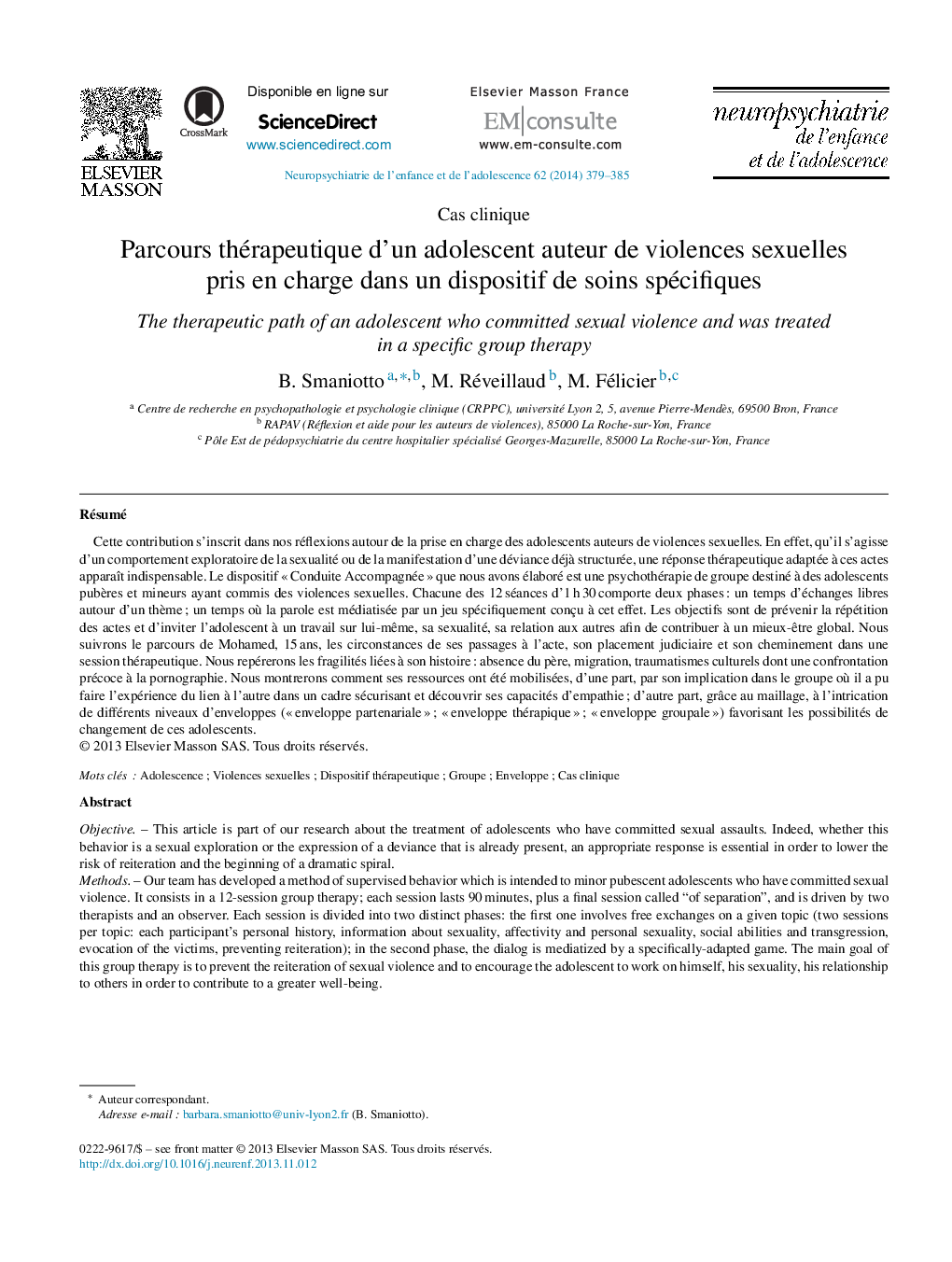| کد مقاله | کد نشریه | سال انتشار | مقاله انگلیسی | نسخه تمام متن |
|---|---|---|---|---|
| 943891 | 925569 | 2014 | 7 صفحه PDF | دانلود رایگان |

RésuméCette contribution s’inscrit dans nos réflexions autour de la prise en charge des adolescents auteurs de violences sexuelles. En effet, qu’il s’agisse d’un comportement exploratoire de la sexualité ou de la manifestation d’une déviance déjà structurée, une réponse thérapeutique adaptée à ces actes apparaît indispensable. Le dispositif « Conduite Accompagnée » que nous avons élaboré est une psychothérapie de groupe destiné à des adolescents pubères et mineurs ayant commis des violences sexuelles. Chacune des 12 séances d’1 h 30 comporte deux phases : un temps d’échanges libres autour d’un thème ; un temps où la parole est médiatisée par un jeu spécifiquement conçu à cet effet. Les objectifs sont de prévenir la répétition des actes et d’inviter l’adolescent à un travail sur lui-même, sa sexualité, sa relation aux autres afin de contribuer à un mieux-être global. Nous suivrons le parcours de Mohamed, 15 ans, les circonstances de ses passages à l’acte, son placement judiciaire et son cheminement dans une session thérapeutique. Nous repérerons les fragilités liées à son histoire : absence du père, migration, traumatismes culturels dont une confrontation précoce à la pornographie. Nous montrerons comment ses ressources ont été mobilisées, d’une part, par son implication dans le groupe où il a pu faire l’expérience du lien à l’autre dans un cadre sécurisant et découvrir ses capacités d’empathie ; d’autre part, grâce au maillage, à l’intrication de différents niveaux d’enveloppes (« enveloppe partenariale » ; « enveloppe thérapique » ; « enveloppe groupale ») favorisant les possibilités de changement de ces adolescents.
ObjectiveThis article is part of our research about the treatment of adolescents who have committed sexual assaults. Indeed, whether this behavior is a sexual exploration or the expression of a deviance that is already present, an appropriate response is essential in order to lower the risk of reiteration and the beginning of a dramatic spiral.MethodsOur team has developed a method of supervised behavior which is intended to minor pubescent adolescents who have committed sexual violence. It consists in a 12-session group therapy; each session lasts 90 minutes, plus a final session called “of separation”, and is driven by two therapists and an observer. Each session is divided into two distinct phases: the first one involves free exchanges on a given topic (two sessions per topic: each participant's personal history, information about sexuality, affectivity and personal sexuality, social abilities and transgression, evocation of the victims, preventing reiteration); in the second phase, the dialog is mediatized by a specifically-adapted game. The main goal of this group therapy is to prevent the reiteration of sexual violence and to encourage the adolescent to work on himself, his sexuality, his relationship to others in order to contribute to a greater well-being.FindingsAfter presenting the therapy method, we will follow the path of Mohamed, 15 years old, the circumstances of his acting out, the judicial consequences and his progress throughout the therapy sessions. We will identify Mohamed's weaknesses linked to his life story: absence of a father, emigration to France, culture shock including a precocious confrontation with pornography. We will show how his resources have been called up by his involvement within the group in which he has experienced the link to the other in a reassuring environment and has discovered his ability for empathy.ConclusionThrough the experience of Mohamed with this method, we can witness the relevance of a group treatment for the adolescents who have committed sexual assaults, as well as the significance of working in network which offers an opportunity to comprehend sexual violence. More particularly, we want to underline the impact of the different envelop levels (“partnership envelop”; “therapeutic envelop”; “group envelop”) as a way to enable these struggling adolescents to change and evolve.
Journal: Neuropsychiatrie de l'Enfance et de l'Adolescence - Volume 62, Issue 6, October 2014, Pages 379–385